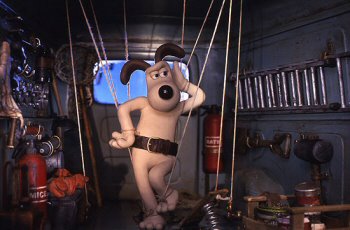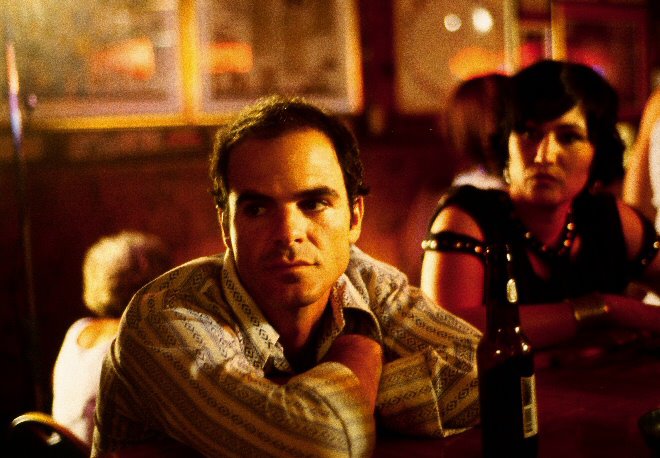 I adored the Wallace & Gromit shorts, and when Chicken Run came out and I merely very much enjoyed it, I figured it was because the new characters didn't work quite as well. But now along comes Wallace & Gromit: The Curse of the Were-Rabbit and I reacted pretty much the same way--very enjoyable, but not quite great. So I'm trying to figure out my reaction. For one thing, I think a review I read by a local curmudgeon slightly biased me, even though I tried hard not to let him. It's hard enough as it is shrugging off adulthood to watch a cartoon properly without a spoilsport trying to ruin the proceedings, but, dammit, it's worth the effort. Aside from that, I wonder if I haven't gotten used to more streamlined, action-packed fare from the likes of Pixar. By comparison, W&G is old-fashioned, and that's not bad. Hand-crafted (marvel at the fingerprints visible on the clay) and featuring a very British brand of silliness, the movie has stayed with me longer than most light entertainments...the bunnys, the suction machine, the vegetables, Gromit's Snoopy-like expressions, the Dr. Jeckyll and Mr. Hyde spoof. They give you a chuckle as you recall them. Pixar films, with their quick wit and fast action, say Watch me again and again! Aardman says, Remember me and smile.
I adored the Wallace & Gromit shorts, and when Chicken Run came out and I merely very much enjoyed it, I figured it was because the new characters didn't work quite as well. But now along comes Wallace & Gromit: The Curse of the Were-Rabbit and I reacted pretty much the same way--very enjoyable, but not quite great. So I'm trying to figure out my reaction. For one thing, I think a review I read by a local curmudgeon slightly biased me, even though I tried hard not to let him. It's hard enough as it is shrugging off adulthood to watch a cartoon properly without a spoilsport trying to ruin the proceedings, but, dammit, it's worth the effort. Aside from that, I wonder if I haven't gotten used to more streamlined, action-packed fare from the likes of Pixar. By comparison, W&G is old-fashioned, and that's not bad. Hand-crafted (marvel at the fingerprints visible on the clay) and featuring a very British brand of silliness, the movie has stayed with me longer than most light entertainments...the bunnys, the suction machine, the vegetables, Gromit's Snoopy-like expressions, the Dr. Jeckyll and Mr. Hyde spoof. They give you a chuckle as you recall them. Pixar films, with their quick wit and fast action, say Watch me again and again! Aardman says, Remember me and smile.Rating: 3 out of 4 stars.
Flightplan: to quote Ebert, I hated, hated, hated this movie. The plot is completely implausible and ridiculous. At every fork in the narrative road the screenplay makes you consider all the possibilities, and then it pursues the least plausible avenue. That's common enough in thrillers, which value surprise more than logic, but this film seemed to have a special grudge against reason and common sense. (This problem has become a pet peeve of mine lately, because I think it's the worst message Americans audiences can be given--we need to be encouraged to seek out facts and think clearly, not be told again and again that the world is too complex and unfathomable. That's what encourages people to retreat into superstition and vote ignorantly.) By comparison, the plot of Red Eye, this year's earlier film in which a woman encounters terror on an airplane, is a model of logical motivation. Actually, Red Eye was more enjoyable in every way starting with just being--shockingly--fun. The tone of Flightplan is one of extreme seriousness, of sobriety. It's thriller-as-church. For any producer looking to snag Jodie Foster in the lead role, it's clear now what she requires in this phase of her career: first, make sure her character's a mother with a daughter, not a son, with certainly no pesky husband (or embarassing girlfriend) around. Second, make sure the film is shot in cold blues and blacks. Third, make sure there's a mystical, irrational element to the story (esp. evidenced in Contact). Fourth, villains? a man or men--any women mixed up in it must be allowed to see the light. But most importantly, drain the film of as much humor as possible. I've long liked Jodie, despite some of her dippier movies (I mean Nell, not Freaky Friday, and I don't mind the first condition at all: it's great to see a female heroine taken seriously as an action hero without having to be exploited as a sex object. But she's really got to let go of some of these other elements of her taste to stretch and grow. At least go back to working with a talented director like Fincher or Demme (maybe even...a woman director! unless that would be much too feminist). As for Peter Sarsgaard, who I've liked up until now, his performance borders on moustache-twirling after a while. I hate to pigeonhole him so early in his career, but he's fairly miscast here. Sean Bean is good in a tiny role, and Greta Scacchi lightens the tone for a moment, but Erika Christensen still hasn't made much of a case for anyone to bother distinguishing her from Julia Stiles.
Rating: 0 out of 4 stars.
I generally hate biopics--they usually try to cover too much of a life and serve mostly as Oscarbait--but I surprisingly liked Capote. It's still Oscarbait--Ebert's already put the Academy on notice twice that Hoffman must be nominated, or else--but it wisely focuses on one chapter of Capote's life, his writing of In Cold Blood (now selling briskly again thanks to the movie). A movie about the writing of a book doesn't sound very promising, but of course there's a terribly gruesome pack of murders at the heart of it to draw the crowds. Friends I went with were impressed with a moment where we and Capote become aware that both the cold-blooded killers are...cold-blooded killers. Well, I wasn't so surprised by that (and it's more complicated and interesting than I just made it sound). What I liked was the way the script actually has bite, a critical point of view on the subject of the biography, unlike so many other biopics. Maybe that's easier when your subject is a flamboyant homosexual intellectual, but it didn't raise my hackles much. As depicted, Capote's relationships are fascinating--he uses people, sometimes ruthlessly, lies to and flatters them, and yet he isn't quite made a villain. A bit of a fool, perhaps, but one who suffers for it. He connects with one of the killers in a direct and personal way and sees a connection between them that most people aren't brave enough or smart enough to see, and it costs him. He profits from it, of course, with the book, but the film also suggests it unmakes him. For that matter, who would have thought that actor Dan Futterman (be still my heart) had such a screenplay in him? The main problem with the script, and it's somewhat debatable, is that it gives short shrift to its secondary characters. Catherine Keener is such a vibrant actress that we certainly want more of her here, as Harper Lee, but there is a delicious moment at a cocktail party when she, on the cusp of a literary fame greater than that of anyone else in the room, is treated patronizingly--oh, little woman, I've heard you're getting published? some book for kids? or about kids? How nice for you. Likewise I always want more from Bruce Greenwood, here playing another small supporting role as a gay man, but of course we know the mainstream can't handle any intimate details about love between men (good luck, Brokeback Mountain), and sex is kept here to a "tasteful" minimum, just a hint here or there. As with Wilde (1997), another biopic about a famous gay writer safely stereotypical and safely in the past, this film is packing in the curious and relatively open-minded. Update: what's the deal with this other Capote project IMDB lists as being in production? Sandra Bullock as Harper Lee? Also, the database lists a Capote character in an upcoming Lasse Hallstrom film. Wow, with all the books and films recently, the late Mr. Capote has been on a hot streak.
Rating: 3 out of 4 stars.
 Loggerheads, on the other hand, isn't so lucky. An incredibly sweet film, mild and melancholy, I suppose it would be of most interest to gay men and possibly their friends and families, but I like to think a good story is worth everyone's time, and sometimes I resent the fact that a decent film like this, with some gay romance (no sex depicted, ya nervous nellies) and plenty of straight characters, withers on the vine. If only someone had been murdered, or one of the characters was a famous artist. But these characters are all ordinary people, divided up into three storylines, each one taking place a year apart (cleverly demarcated, despite crosscutting, by background news reports on radios and televisions) until they converge in the end. The characters are all related, of course, but it's the fleshing out of relationships that makes the story moving. Even its obvious symbolism is somewhat forgivable for being natural, heartfelt and meaningful. I felt this covered territory similar to Junebug--culture clash (abortion vs. adoption, Christian intolerance of gays) in one of the "red states," here North Carolina, and maybe I liked this one more because it's more progressive, but it's certainly a much more optimistic film. Michael Kelly gives one of the most convincing and beautiful performances I've ever seen as a gay man who chooses to live in rural America, and Kip Pardue holds his own as his love interest. There are definitely some cliches in the script, but it all felt very lived in to me.
Loggerheads, on the other hand, isn't so lucky. An incredibly sweet film, mild and melancholy, I suppose it would be of most interest to gay men and possibly their friends and families, but I like to think a good story is worth everyone's time, and sometimes I resent the fact that a decent film like this, with some gay romance (no sex depicted, ya nervous nellies) and plenty of straight characters, withers on the vine. If only someone had been murdered, or one of the characters was a famous artist. But these characters are all ordinary people, divided up into three storylines, each one taking place a year apart (cleverly demarcated, despite crosscutting, by background news reports on radios and televisions) until they converge in the end. The characters are all related, of course, but it's the fleshing out of relationships that makes the story moving. Even its obvious symbolism is somewhat forgivable for being natural, heartfelt and meaningful. I felt this covered territory similar to Junebug--culture clash (abortion vs. adoption, Christian intolerance of gays) in one of the "red states," here North Carolina, and maybe I liked this one more because it's more progressive, but it's certainly a much more optimistic film. Michael Kelly gives one of the most convincing and beautiful performances I've ever seen as a gay man who chooses to live in rural America, and Kip Pardue holds his own as his love interest. There are definitely some cliches in the script, but it all felt very lived in to me. Rating: 3 out of 4 stars.
News item: The Chicago International Film Fest just got a $25,000 grant.
Song: "Broken Ship" by Immaculate Machine
Labels: Movie Reviews


0 Comments:
Post a Comment
<< Home